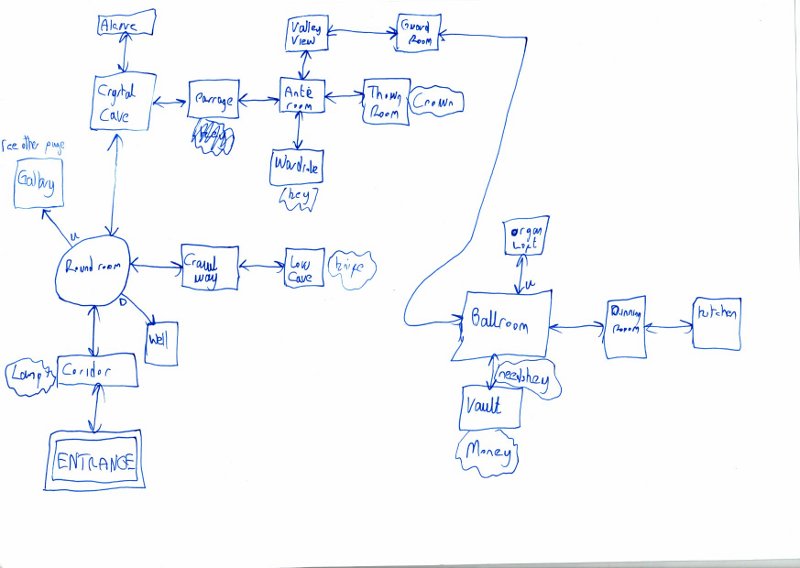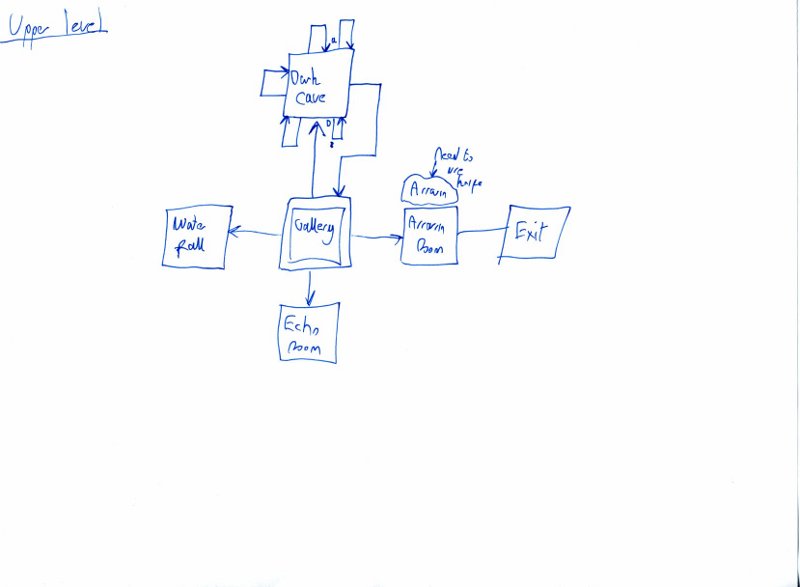#
# Barry's simple adventure game
#
# Room data indexs
SHORT_DESC = 0
LONG_DESC = 1
N_EXIT = 2
S_EXIT = 3
E_EXIT = 4
W_EXIT = 5
U_EXIT = 6
D_EXIT = 7
OBJECT = 8
# Room Data
rooms = [
['dummy'],
['the entrance', 'the entrance to a rather large looking cave', 2, 0, 0, 0, 0, 0, ''], # 1
['a coridor', 'a coridor that stretches off to the North', 3, 1, 0, 0, 0, 0, 'Lamp'], #2
['a round room', 'a round room with many exits', 7, 2, 4, 0, 20, 6, ''], #3
['a crawlway', 'a narrow east / west crawlway', 0, 0, 5, 3, 0, 0, ''], #4
['a low cave', 'a low dead end cave', 0, 0, 0, 4, 0, 0, 'Knife'], #5
['a well', 'a deep well with no way out', 0, 0, 0, 0, 0, 0, ''], #6
['a crystal cave', 'a beautifull cave with crystal walls', 8, 3, 9, 0, 0, 0, ''], #7
['an alcove', 'a small alcove in the cave wall', 0, 7, 0, 0, 0, 0, ''], #8
['a passage', 'a long east / west passage', 0, 0, 10, 7, 0, 0, ''], #9
['an anteroom', 'a richly decorated anteroom', 13, 11, 12, 9, 0, 0, ''], #10
['a wardrobe', 'a large wardrobe with space for lots of clothes', 10, 0, 0, 0, 0, 0, 'Key'], #11
['the throne room', 'a very large room with a golden throne on a dais', 0, 0, 0, 10, 0, 0, 'Crown'], #12
['the view room', 'a cave with a small hole giving a view along a green valley', 0, 10, 14, 0, 0, 0, ''], #13
['the guard room', 'a room with chairs and a table that looks like it was used as a guard room', 0, 0, 15, 13, 0, 0, ''], #14
['the ballroom', ' a magnificent ballroom with purple and gold walls', 0, 17, 18, 14, 16, 0, ''], #15
['the organ loft', 'a small room containing the controls for a large pipe organ', 0, 0, 0, 0, 0, 15, ''], #16
['the vault', 'a small airtight vault with shelves around the sides', 15, 0, 0, 0, 0, 0, 'Diamond'], #17
['the dining room', 'a long room with a huge dining table and chairs', 0, 0, 19, 15, 0, 0, ''], #18
['the kitchen', 'a large dusty kitchen', 0, 0, 0, 18, 0, 0, ''], #19
['a gallery', 'a high gallery leading off in a number of directions', 24, 22, 23, 21, 0, 3, ''], #20
['the waverfall cave', 'a large cave with a dark lake and a waterfall at the far end', 0, 0, 20, 0, 0, 0, ''], #21
['the echo cave', 'a small cave where sound echoes all around', 20, 0, 0, 0, 0, 0, ''], #22
['the assasin room', 'a small room bare room', 0, 0, 25, 20, 0, 0, 'a dead Masked Man'], #23
['a dark cave', 'a dark cave', 24, 24, 20, 24, 24, 24, ''], #24
['the exit', 'the exit of the cave', 0, 0, 0, 23, 0, 0, ''] #25
]
objects = ['dummy']
visits = [0]
for room in range(1, rooms.__len__()):
objects.append(rooms[room][OBJECT])
visits.append(0)
current_room = 1
visits[current_room] = 1
inventory = []
battery = 100
# Code
def describe_room(room):
print
if visits[room] > 1:
print 'You are in ' + rooms[room][SHORT_DESC]
else:
print 'You are in ' + rooms[room][LONG_DESC]
print
if rooms[room][N_EXIT] != 0:
print 'There is an exit to the North'
if rooms[room][S_EXIT] != 0:
print 'There is an exit to the South'
if rooms[room][E_EXIT] != 0:
print 'There is an exit to the East'
if rooms[room][W_EXIT] != 0:
print 'There is an exit to the West'
if rooms[room][U_EXIT] != 0:
print 'There is an exit leading upwards'
if rooms[room][D_EXIT] != 0:
print 'There is an exit leading downwards'
if objects[room] != '':
print
print 'There is a ' + objects[room] + ' here'
print
def move(exit):
global current_room
if rooms[current_room][exit] != 0:
# Can't enter the vault without the key
if ((current_room == 15) and (rooms[current_room][exit] == 17)):
if 'Key' in inventory:
print
print
print "You use the key to open the door to the vault"
current_room = rooms[current_room][exit]
visits[current_room] += 1
else:
print
print
print "You can't open the heavy door but it does have a key hole"
else:
current_room = rooms[current_room][exit]
visits[current_room] += 1
else:
print
print
print '>>> There is no exit in that direction'
def north():
move(N_EXIT)
def south():
move(S_EXIT)
def east():
move(E_EXIT)
def west():
move(W_EXIT)
def up():
move(U_EXIT)
def down():
move(D_EXIT)
def get():
if objects[current_room] == command.split()[1]:
objects[current_room] = ''
inventory.append(command.split()[1])
else:
print
print "There is not a " + command.split()[1] + " here"
def drop():
if command.split()[1] in inventory:
inventory.remove(command.split()[1])
objects[current_room] = command.split()[1]
else:
print
print "You are not carrying a " + command.split()[1]
def inv():
print("Inventory: ")
for item in inventory:
print item
commands = {
'north' : north,
'n' : north,
'south' : south,
's' : south,
'east' : east,
'e' : east,
'west' : west,
'w' : west,
'up' : up,
'u' : up,
'down' : down,
'd' : down,
'get' : get,
'inventory' : inv,
'inv' : inv,
'drop' : drop
}
# Main game loop
exit = False
while (not exit):
print
print
describe_room(current_room)
command = raw_input( "What do you want to do: " )
if command != "":
command_name = command.split()[0]
else:
command_name = "none"
if command_name in commands.keys():
commands[command_name]()
else:
print
print
print '>>> I don\'t understand that'
# Check lamp
if 'Lamp' in inventory:
battery = battery - 1
if battery == 50:
print
print
print "The battery in your lamp is half used"
else:
if battery == 25:
print
print
print "The battery in your lamp is three quarters used"
else:
if battery == 10:
print
print
print "The battery in your lamp is almost exhausted"
else:
if battery == 0:
print
print "Your lamp has failed"
print "You fell in a pit and died!!"
print
exit = True
else:
if current_room == 3:
print
print
print "It's dark here, you should find a light source or you might get hurt"
else:
if current_room > 3:
print
print "You fell in a pit and died!!"
print
exit = True
# Assasin puzzle
if current_room == 23:
if 'Knife' in inventory:
print
print
print "You killed a masked man with the knife you were carrying, well done"
else:
print
print "A masked man killed you, you should have looked for a weapon!"
print
exit = True
# Win check
if current_room == 25:
if (('Crown' in inventory) and ('Diamond' in inventory)):
print
print "Well done, you found all of the treasure"
print
exit = True
else:
print
print "There is more treasure to find, go back and keep looking"
print |

